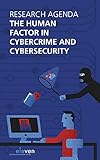The human factor in cybercrime and cybersecurity : research agenda / Rutger Leukfeldt (editor).
Material type: TextPublisher: The Hague, The Netherlands : Eleven International Publishing, [2017]Copyright date: ©2017Description: 95 pages : color illustrations ; 22 cmContent type:
TextPublisher: The Hague, The Netherlands : Eleven International Publishing, [2017]Copyright date: ©2017Description: 95 pages : color illustrations ; 22 cmContent type: - text
- unmediated
- volume
- 9789462367531
- 9462367531
- 364.168 23
- HV6773.H85 2017
| Item type | Current library | Collection | Call number | Copy number | Status | Barcode | |
|---|---|---|---|---|---|---|---|
 Books
Books
|
Rabdan Academy General Stacks | Non-fiction | HV6773.H85 2017 (Browse shelf(Opens below)) | 1 | Available | 158364 |
Includes bibliographical references (pages 77-88).
With the digitization of society, crime has also digitized. Digitization has consequences for the entire spectrum of crime and raises all sorts of questions. For example, are we dealing with a new type of offender, or with the same old offenders who simply moved their activities online? How can potential victims be made resilient against attacks? And who should protect potential victims: the police, commercial cybersecurity companies, or internet service providers? To date, many of these questions remain unanswered. This is partly because current studies have a strong focus on technology or are exploratory in nature, suffer from methodological limitations and focus on just a few of the many types of cybercrime. The aim of this research agenda is to stimulate research on the human factor in cybercrime and cybersecurity. The agenda provides the state-of-the-art of research on the role of the human factor in this field. In addition, examples are given of important research questions and innovative methods and datasets that are needed for future studies.
There are no comments on this title.
